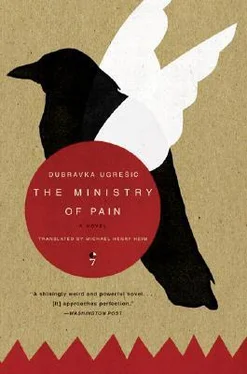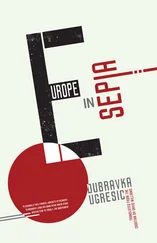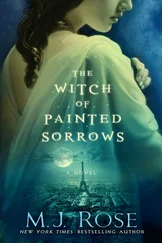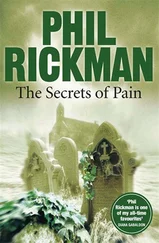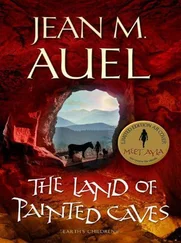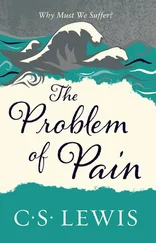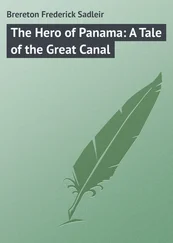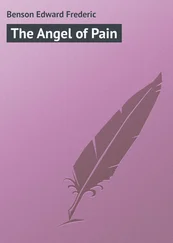I stocked the kitchen cupboards with the basics and bought a new teapot and an elegant china teacup. Nor did I neglect the rubber plant. I took it out onto the balcony, replanted it in a bigger pot, mixing in enriched soil, pruned the dead branches, wiped the dust off the leaves, and brought it back into the living room. I looked through the collection of videos Geert and Ana had left behind, dusted them off and arranged them neatly in the bookshelf. I wiped the covers of their books with alcohol and put them back on the shelves next to the ones I had brought.
On a tour through the flat looking for other things in need of repair, I noticed that the wallpaper just above the door leading to the living room had buckled a bit. I took the ladder out of the closet where the gas and electricity meters were, and climbed up to finger the place in question. It burst like a balloon, scattering bits of plaster over the floor and revealing a concrete wall covered with postcards and magazine illustrations, now completely yellow. I broke off a piece to get a better look at it, and off came several layers of paint, which fell to the floor with a thwack . I stood facing a “frieze” of pornographic images, an amateur collage of homosexual fantasies, most likely the work of the tenant who had lived there before Geert and Ana. They showed dark-skinned boys with laurel wreaths on their heads either urinating, kissing, or embracing against a stylized Greco-Roman backdrop. The paper, which had turned the color of stale urine as it became one with the wall, made me retch.
I climbed down and sat on the couch, unable to move, listening to the silence. Suddenly I heard a popping sound and looked up, holding my breath, to see the wallpaper cracking open along the walls, making a series of wavy, eventually joining paths. I watched them crack, peel, reel, twist like springs until off they snapped, and dropped with a crisp, dry thud. I was surrounded by a wall of dust raised by an invisible wind. I threw a glance at the front door, but, no, the key was in the lock. In the meantime, the silence had returned. I looked down at my hands. They were red and swollen. The detergents had taken their toll: my hands were one big wound, the skin peeling off in tiny flakes to reveal the three bloody stripes.
It occurred to me that I hadn’t looked out the window even once during the past few days. I didn’t know what the weather was like or what time it was. I had completely lost my bearings. I just sat there holding an invisible low-life visa and peeling inside.
I realized I had to pick myself up and do something, anything. I had to combat the despair that had momentarily taken me over. I stood, pulled down the first video that came to hand, and popped it into the VCR. Then I went back to the couch, gave the spread enough of a shake to send the scraps of wallpaper that had alighted on it to the floor, and lay down.
At some point during the night I was awakened by the buzz of the television set. The snow on the screen seemed to have slipped into the room. I opened the window and let in the July air. The concrete square was shining in the moonlight and the neon BASIS sign on the building across the square. To the right I could just make out a corner of the modest local mosque’s turquoise dome. The square had some squat, small-crowned chestnut trees and a few benches. There was a man sitting on a bench beneath a tree. He was wearing a turban. He seemed to be asleep.
Geert and Ana’s flat was in one of those gray, crowded, cheaply constructed prefabs that encircle the city center like keys on a castellan’s ring. Some people call them ghettos. This one was called “Little Casablanca.” But I was not to learn that until later.
We are barbarians.The members of our tribe bear the invisible stamp of Columbus on their foreheads. We travel west and end up east; indeed, the farther west we go the farther east we get. Our tribe is cursed.
We settle on the outskirts of cities. We choose them so we can gather up our tents when the time comes and set off again, move farther west to get farther east. We live in gray, crowded, cheaply constructed prefabs that encircle the city center like keys on a castellan’s ring. Some people call them ghettos.
All our settlements are the same. They can be recognized by the round metal satellite dishes sticking out from our balconies, the devices that enable us to feel the pulse of the people we have left behind. We, the losers, are still one with the mega-circulating lifeblood of the land we abandoned in hatred. Except the people there have no antennas; they have dogs. At twilight their dogs go out onto the balconies and bark their messages to one another. Their barking bounces back and forth against the concrete buildings like Ping-Pong balls. The echo drives them mad. They bark even louder.
We have children. We multiply dangerously. Kangaroos are said to have one of their young in tow, another in their pockets, a third in their wombs on the point of bursting out and a fourth, in the form of a barely fertilized egg, waiting to take its place. Our women are as big as kangaroos: they have their numerous offspring in tow like the keys on the ring of a castellan’s wife. Our children have straight necks, dark complexions, dark hair, and black eyes; our children are clones, the males little men, the spit and image of their fathers; the females little women, the spit and image of their mothers.
Here we bring neatly packed food home from Basis and Aldi and Lidl and Dirk van de Broek; there we buy wholesale, in bulk. Our fish markets reek of fish, our butcher shops of blood. Our shops are dirty: we buy meat from large plastic barrels filled with brine. We finger everything, pick at it, poke at it, turn it over, listen to it, and then drag it from stall to stall. The bazaar is the very heart of our existence.
Our settlements are like oases: they satisfy our every need. They’ve got nursery schools and elementary schools and driving schools; they’ve got post offices and filling stations and telecom centers offering cheap rates to the home country; they’ve got dry cleaners and launderettes and beauty salons, where our people cut our people’s hair; they’ve got coffee shops, where the young can get their hashish, and the other youth center, Turkse Pizza ; and they’ve got our place of worship and two or three of our pubs for the men. We’ve got our pubs; they have theirs. The zones are sharply delineated. No tourists find their way to us, except when lost. As for the high life, the “canal people,” they say they need a low-life visa. And what would they do here anyway? So they stick to their part of town and we to ours. Everyone feels safer that way, more at home.
We are barbarians. We are the false bottom of the perfect society, we are its thumb-nosing jack-in-the-box, its demimonde, its ugly underside — its parallel world. We wade through its shit, canine and human; we confront its rats in our early-morning and late-night peregrinations. The wind comes to us to blow litter through the air: the plastic bags we leave behind, the Mars, Kit-Kat, and Snickers wrappers our children drop. And every morning seagulls come to dine on rotting junk food, magpies to peck at Turkish pizza.
Our young men are wild and sullen, full of anger. At night they converge in the concrete wasteland like packs of stray dogs and let off steam till the wee hours. They chase one another across abandoned playgrounds, swinging on swings, jumping and shouting; they yank receivers out of public phone booths; they hurl stones at car windows; they steal whatever they can lay their hands on; they play soccer with empty beer cans that sound like machine guns; they ride their motorcycles like maniacs through the settlements. Nighttime is their time. We hide and tremble like mice: their caterwauling makes our blood run cold. The police give our zone a wide berth; they let the screams eat into us like acid. Our young men are quick with their knives: their knives are extensions of their hands. Our young men are champion spitters: their spittle marks their territory as dogs’ urine marks theirs. And they always run together, in a pack, like village curs.
Читать дальше
